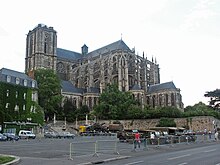Julian of Le Mans
Saint Julian of Le Mans | |
|---|---|
| Died | 3rd or 4th century |
| Venerated in | Roman Catholic Church |
| Major shrine | Le Mans |
| Feast | January 27; July 25 (translation of relics) |
| Attributes | Sometimes pictured as a bishop raising a dead child to life, Julian is also shown vanquishing a dragon. |
Saint Julian of Le Mans (Template:Lang-fr) (3rd century; perhaps 4th century) is honored as the first bishop of Le Mans. His feast day is January 27. The translation of his relics is celebrated on July 25.
Life
It is believed that he may have been a Roman nobleman, but he was also identified with Simon the Leper or as one of the seventy-two disciples of Christ.
He was consecrated a bishop at Rome and around the middle of the third century, Julian was sent to Gaul to preach the Gospel to the tribe of the Cenomani. Their capital city was Civitas Cenomanorum (Le Mans), which was suffering from a shortage of drinking water. According to the legends surrounding his life, Julian thrust his staff into the ground and prayed. Water began to gush out of the ground. This miracle allowed him to preach freely within Le Mans. The city's principal citizen was converted to Christianity along with his family, donating to the Church part of his palace to serve as Le Mans' first cathedral church.
Julian converted many other citizens and Le Mans' new bishop cared for the poor, the infirm, and the orphans. His miracles included the resurrection of a dead man.
Upon reaching old age, he retired to live as a hermit at Sarthe.
Veneration

The Cathédrale St-Julien, in Le Mans, is dedicated to him.
The feast of St. Julian of Le Mans was celebrated in England because Henry II of England had been born in Le Mans. His feast was kept throughout the south of England in at least nine Benedictine English monasteries. The Church of St. Julian in Norwich may be dedicated to him. Having rested in a shrine at the Benedictine convent of Saint-Julian-du-Pré since the Middle Ages, his relics were burnt or scattered by the Huguenots in 1562. Julian's head is still shown at the cathedral of Le Mans, where it has been shown since 1254.
